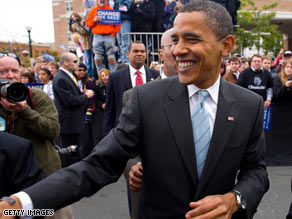President-elect Barack introduced retired Army Gen. Eric K. Shinseki as his nominee to head the Department of Veterans Affairs, bringing to his Cabinet a career military officer best known for running afoul of the Bush administration by questioning the Pentagon's Iraq war strategy.
Shinseki, a four-star general and 38-year veteran who retired shortly after the fall of Baghdad in 2003, appeared with Obama in Chicago at a news conference today commemorating the 67th anniversary of the Japanese attacks on Pearl Harbor. Obama said Shinseki agreed to join the incoming administration because "both he and I share a reverence for those who serve."
"When I reflect on the sacrifices that have been made by our veterans and I think about how so many veterans around the country are struggling even more than those who have not served -- higher unemployment rates, higher homeless rates, higher substance-abuse rates, medical care that is inadequate -- it breaks my heart, and I think that General Shinseki is exactly the right person who is going to be able to make sure that we honor our troops when they come home," Obama told NBC News' Tom Brokaw in a interview taped for broadcast today on "Meet the Press."
Shinseki was Army chief of staff when, during the run-up to the Iraq war, he publicly disputed the Bush administration's determination to invade with a relatively small force. To maintain the postwar peace in Iraq, Shinseki told the Senate Armed Services Committee in February 2003, "something on the order of several hundred thousand soldiers" could be necessary. Defense Secretary Donald H. Rumsfeld reacted by telling reporters that the estimate "will prove to be high," and Deputy Secretary of Defense Paul D. Wolfowitz called it "way off the mark."
When Shinseki retired that summer, neither Rumsfeld nor Wolfowitz attended his farewell ceremony.
Three years later, Gen. John P. Abizaid, chief of U.S. Central Command and the main architect of U.S. military strategy in Iraq, told the same committee, "General Shinseki was right." And in January 2007, President Bush ordered tens of thousands of U.S. troops back into Iraq to stabilize and secure the country.
Notably, Shinseki led the Army at the same time that Gen. James L. Jones, Obama's pick for national security adviser, commanded the Marines. Both questioned Wolfowitz's presumptions, before the war in Iraq commenced, about how the fighting would go, and they argued that the Pentagon was being too optimistic in its planning and should prepare thoroughly for worst-case scenarios.
In a 12-page private letter he wrote to Rumsfeld in June 2003 just before stepping down as chief of staff, Shinseki said: "People are central to everything we do in the Army. Institutions don't transform, people do. Platforms and organizations don't defend the nation, people do. . . . Without people in the equation, readiness and transformation are little more than academic exercises." The letter was never publicly released; The Washington Post obtained a copy this August.
Military leaders and veterans advocates hailed Obama's selection of Shinseki, describing the nominee as a soft-spoken, dynamic leader who is widely respected by rank-and-file service members past and present.
Retired Army Gen. Colin L. Powell, who was President Bush's secretary of state at the time of the Iraq invasion, called Shinseki "a superb choice. . . . He is a wounded hero who survived and worked his way to the top. He knows soldiers and knows what it takes to keep faith with the men and women who went forth to serve the nation. He also knows how to run large and complex bureaucratic institutions. His is an inspired selection." Powell, also a former chairman of the Joint Chiefs of Staff, supported Obama's election.
Shinseki, 66, was twice awarded a Purple Heart for injuries sustained in Vietnam.
Kori Schake, a fellow at the conservative Hoover Institution who served on Bush's National Security Council during the run-up to the war, said Shinseki is "a great choice. . . . Shinseki will be a terrific advocate for and leader of our Veterans Administration. He distinguished himself in caring for wounded warriors while chief of staff, and I'm certain he will serve veterans and the country well."
'Business' 카테고리의 다른 글
| Obama vows to unveil strong financial regulations (0) | 2008.12.08 |
|---|---|
| Call for GM's Wagoner to Resign (0) | 2008.12.08 |
| Refinancing Your Mortgage (0) | 2008.12.07 |
| Hollywood Feels the Credit Crunch (0) | 2008.12.07 |
| Auto Bailout Accord Nearly Reached (0) | 2008.12.07 |





